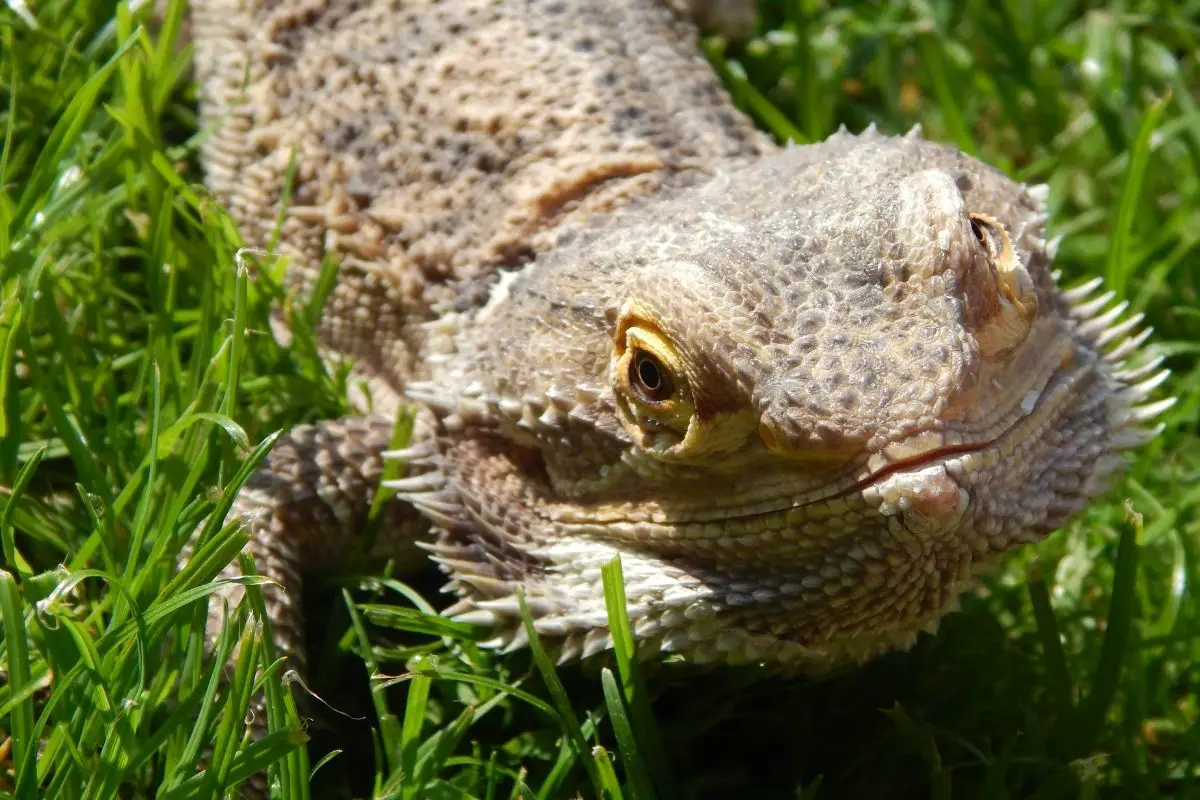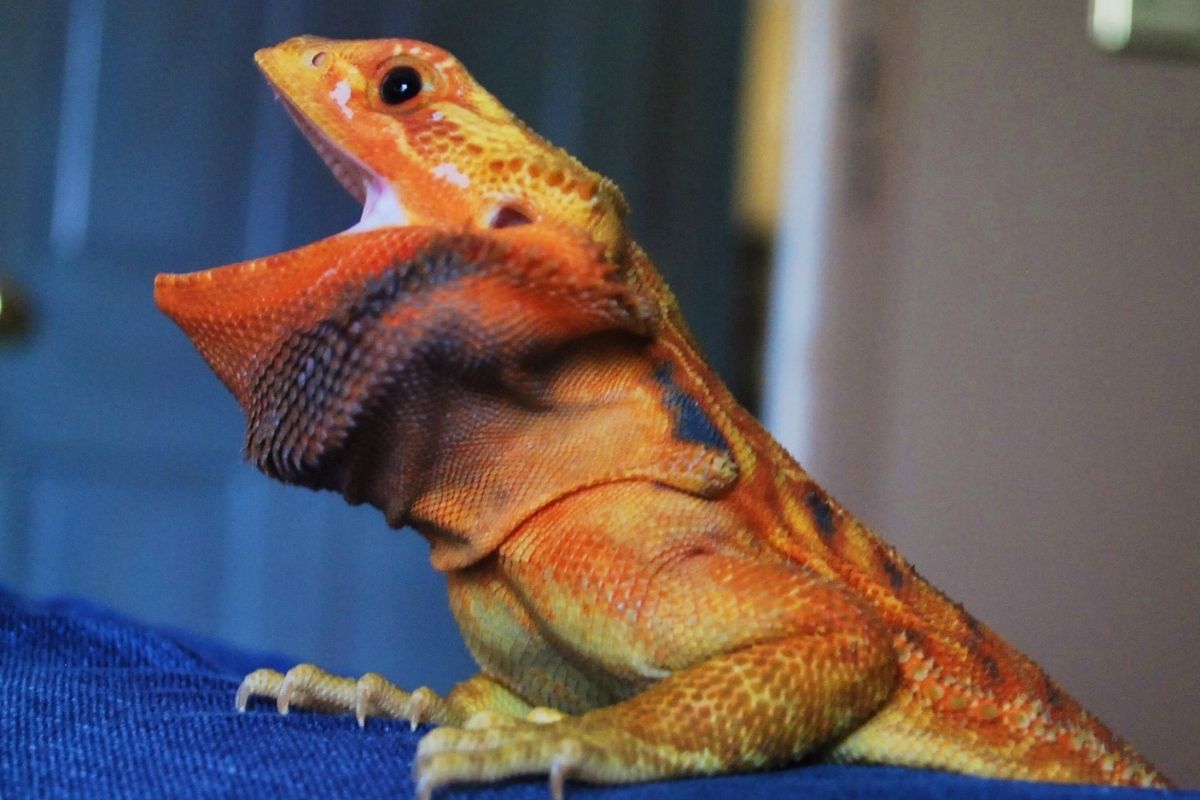Bearded dragons are a popular pet for many people. They are often kept as pets, and they can be very friendly to humans. However, there is one thing that may have surprised you about yours: hissing.
The hissing of a bearded dragon may seem like odd behavior, but it’s actually quite common. In fact, some people even think that hissing is part of their personality. If your bearded dragon hisses at you, there are some things you should know.
In this article, we shall explain exactly why a bearded dragon might hiss and what you can do about it.

What Is Hissing?
Hissing is when a reptile makes a sound with its mouth. The sounds made by reptiles are called “calls.” This includes lizards, snakes, turtles, tortoises, frogs, salamanders, crocodiles, and more.
Reptiles make these calls in order to communicate with each other or to warn others away from them.
Hissing is not just limited to reptiles. Many birds also hoot, chirp, squawk, and screech. These noises are used to either attract mates or scare off predators.
Although most animals use a variety of different sounds to communicate, reptiles tend to rely on one type of call. This is because they lack vocal cords. Instead, they produce sounds using muscles in their throats.
When a reptile hisses, it uses its throat muscles to expand its airway. As the airway expands, it creates pressure inside the body.
When the pressure reaches a certain point, it causes the walls of the throat to vibrate. This vibration produces a hissing noise.
Is It Normal?
Yes! Hissing is normal for bearded dragons. Some people think that it means that the lizard is angry or that it wants something. While this is true for some species of lizards, it isn’t always the case.
For example, if a lizard hisses at you, it could mean that it needs food. Or it could be trying to tell you to leave it alone. Sometimes, it could even be warning you of danger.
However, if a lizard hissed at you, don’t assume that it was angry. A lizard will sometimes hiss when it is scared or when it feels threatened.
How Do I Stop Him From Hissing?
If your bearded dragon hisses, then you may need to stop him. There are two ways to do this. First, you can try to get the lizard to calm down.
If he has already started to hiss, you can distract him by playing with him.
If your lizard doesn’t want to play, you can gently stroke him or give him treats. Another way to stop him would be to pick up the lizard and place him somewhere else. If he continues to hiss, then you can put him back into his cage.
You should only do this if you really need to. Don’t let him hiss all day long. If you do, then he will start to feel frustrated and stressed out.
Eventually, he will probably bite you.
Does Hissing Mean That a Bearded Dragon is Angry?
No! Although many people believe that a bearded dragon’s hissing means that he is angry, this isn’t necessarily true.
A bearded dragon’s voice box is located near his brain. When he hears a loud noise, such as a door slamming shut, he thinks that someone is coming into his home. He starts to hiss so that he can warn everyone else.
He does this by making a hissing sound through his throat. However, he doesn’t actually feel any anger toward anyone. In fact, he might even be happy that someone is finally leaving!
What Are Other Types of Calls That Lizards Make?
Lizards make many types of calls. These include:
- Chirping – This is a short, high-pitched call. Most lizards make this kind of sound to warn other members of their group about danger.
- Squawking – This is a loud, low-frequency call. The sound is similar to an alarm clock going off.
- Screeching – This is a shrill, high-pitched cry. It is often used as a threat.
- Growling – This is a deep, rumbling sound. It is made when a lizard is protecting itself from predators.
- Barking – This is a sharp bark. It is most commonly heard during mating season.
- Whining – This is a soft, high-pitched whine. It is made when lizards are in distress.
- Cooing – This is a soft chirp. It is normally used to communicate with babies.
Do All Lizards Hiss?

No. Not all species of lizards hiss. In fact, not all reptiles hiss at all.
Some animals, such as snakes, use hissing as a form of communication. Snakes will hiss when they are feeling threatened.
Other reptiles, such as turtles, crocodiles, and iguanas, also use hissing as a defense mechanism.
Some reptiles, however, don’t hiss. Instead, they use different vocalizations. For example, some lizards use cooing sounds to attract mates.
Can I Get My Lizard To Stop Hissing?
Yes! As mentioned earlier, there are several things that you can do to help your lizard stop hissing.
The best thing to do is to keep him happy. If you are able to distract him, then you can stop him from hissing.
Another option is to take him outside. If he stops hissing when he is outdoors, then you know that it was because he didn’t feel safe or relaxed. There is a good chance he was stressed in the environment he was in.
Another option is to offer him food. He may hiss when he is trying to ask you for food.
Finally, you can put him in another room. If he stops hissing when he is away from you, then you know that he wants to be alone.
Frequently Asked Questions
Here are a few common questions when it comes to bearded dragons and the sounds they make:
What Should I Do If My Bearded Dragon is Hissing Because He’s Angry?
Although bearded dragons hiss when they are afraid, they aren’t always angry. They sometimes hiss if they are just curious about something new.
However, they can still hiss and be angry. If you think that your lizard is being aggressive towards you, then you should contact your local reptile rescue center. They can assess whether, or not, your lizard needs medical attention.
How Long Can a Lizard Stay Away From Me?
If you need your lizard to stay away from you, then try to avoid getting too close to him. This can sometimes be the case if they are angry.
When you get closer than 2 feet (61 cm) to your lizard, he may start hissing. If you continue to approach him, then he will eventually bite you.
When this happens, you should immediately back up and leave the area. Don’t worry, though. Your lizard won’t hurt you unless he feels like he has no other choice but to defend himself.
Should I Be Worried If My Bearded Dragon Starts Hissing?
Not necessarily. Some people believe that hissing is an indicator that their lizard is sick. However, this isn’t true.
Hissing is actually normal behavior for bearded dragons. It helps them to express themselves. It doesn’t mean that your lizard is sick.
Is Hissing Dangerous?
Hissing is never dangerous. Even if your lizard does hiss aggressively, he will only attack if he feels like he has absolutely no other choice.
He will most likely hiss at you before he bites.
You can tell that he is going to bite by the way that he holds his head. His mouth will be open, and his teeth will be showing.
You can also see the muscles on his neck tense up.
If you want to protect yourself, you should stand very still so that you don’t provoke him into biting you.
Final Thoughts
It’s important to remember that bearded dragons aren’t aggressive creatures. They are usually very friendly towards humans.
However, they still have natural instincts. For instance, they can become defensive if they feel threatened.
This happens when they see someone approaching them. At this time, they will hiss. But, if you approach them slowly, they shouldn’t react like this.
Bearded dragons can also hiss if they are afraid. If you accidentally grab it, it might hiss. Even so, it doesn’t mean there is anything wrong with your bearded dragon if it hisses.
